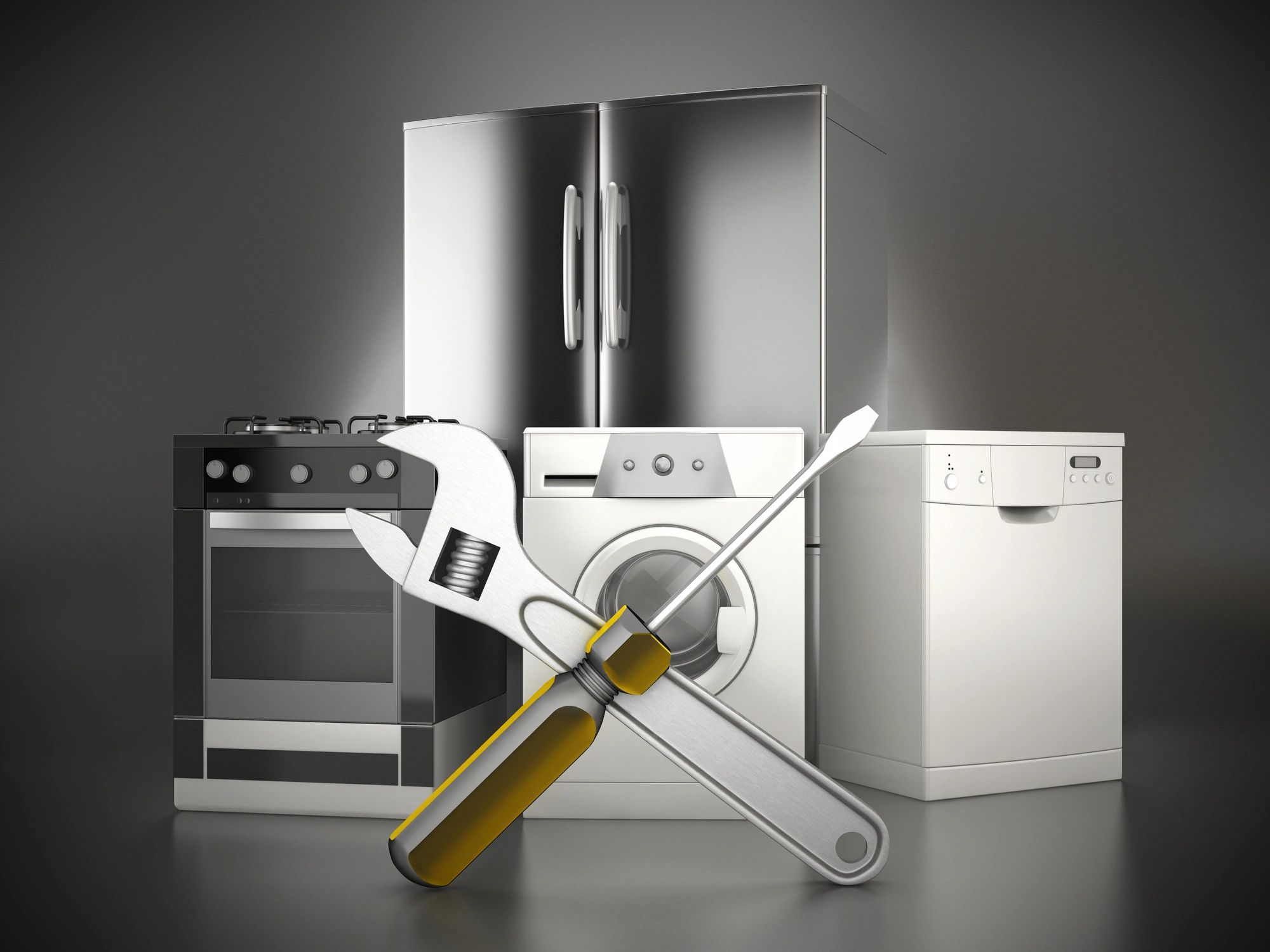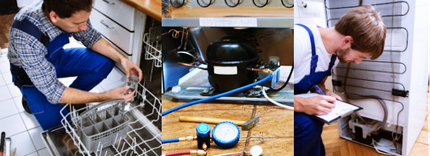How to Stop Your Washer from Shaking – Maytag Washing machine repair Dependable Refrigeration & Appliance Repair Service
How to Stop Your Washer from Shaking – Maytag Washing machine repair Dependable Refrigeration & Appliance Repair Service
Blog Article
The Ultimate Overview to Comprehending Appliance Repair Service in the house
When your fridge quits cooling or your oven refuses to warmth, it can feel frustrating. Recognizing home appliance fixing at home can save you money and time. You'll learn to identify signs and symptoms, utilize important devices, and adhere to an organized troubleshooting process. However prior to you start, there are crucial safety and security preventative measures you require to consider. What are one of the most typical issues, and how can you fix them? Let's discover the basics.
Usual Device Problems and Their Signs and symptoms
When your appliances start acting up, it's important to acknowledge the signs beforehand. Overlooking them can bring about bigger issues and pricey fixings. For circumstances, if your refrigerator isn't cooling correctly, you may observe warm areas or condensation forming. This can suggest a stopping working compressor or an obstructed vent.Your dish washer might show troubles with unclean recipes or uncommon noises during cycles. If you listen to grinding or clanking, it's time to investigate.A washing machine that won't spin or drain can leave you with soaked laundry, recommending a clogged drainpipe or a malfunctioning pump.Lastly, if your oven's temperature level appears off or it takes for life to preheat, you may be taking care of a damaged thermostat. By remaining alert to these symptoms, you can attend to issues prior to they intensify into significant repair work.
Important Devices for Home Appliance Repair
When you're taking on device fixings in the house, having the right devices is essential. Basic hand tools like screwdrivers and pliers will help you take apart and take care of numerous home appliances, while electrical testing devices guarantee you're working securely with wiring. Let's discuss what you need to begin on your repair work journey.
Fundamental Hand Devices
Having the right tools is vital for efficient device fixing in the house. Begin with a dependable screwdriver collection, consisting of both flathead and Phillips kinds, as screws are usual in device assembly. Pliers are likewise essential; they help with gripping, twisting, and cutting wires or tiny elements. A pair of needle-nose pliers can reach tight places quickly. You'll require a good adjustable wrench for tightening up or loosening nuts and bolts. An utility blade is helpful for puncturing packaging or insulation. Don't forget a sturdy workbench or surface area to safely organize your devices and parts. With these basic hand devices, you'll be well-prepared to tackle most device fixings that come your means.
Electrical Screening Gadgets
Alongside basic hand tools, electric testing tools play a vital duty in home appliance repair. These devices help you identify electric issues and guarantee appliances work securely. A multimeter is vital; it gauges voltage, existing, and resistance, allowing you to determine problems swiftly. A non-contact voltage tester is one more must-have, allowing you spot live cords without making straight contact, enhancing your security. Secure meters are excellent for measuring current circulation in cables without separating them, saving you time and effort. Furthermore, circuit testers can rapidly inspect if electrical outlets are operating effectively. By utilizing these tools, you'll streamline your troubleshooting process and boost your repair service abilities, making appliance maintenance a lot much easier.
Step-by-Step Guide to Diagnosing Appliance Issues
When your home appliance breaks down, it can be aggravating, however identifying the issue doesn't have to be overwhelming. You'll find out to identify common problems and apply effective fixing methods. Let's go through the actions to obtain your home appliance back in working order.
Common Home Appliance Issues

Troubleshooting Techniques Explained

Repairing Major Cooking Area Appliances: A Closer Look
Have you ever asked yourself exactly how to tackle usual issues with your kitchen devices? Repairing significant cooking area devices like fridges, stoves, and dishwashers can be much easier than you believe. Start by recognizing the issue-- whether it's a refrigerator not cooling down or a stove that won't heat up. Often, a straightforward reset or examining the source of power can address the issue.For refrigerators, clean the condenser coils and inspect the door seals. If your stove's not heating, check the heating aspect and thermostat. Dishwashing machines could just require a clean filter or a reset to obtain them back in action. Always disconnect the home appliance before diving into repair services to guarantee your safety.Don' t neglect to speak with the customer manual for particular repairing pointers associated with your model. With a little persistence and the right devices, you can confidently deal with appliance repairs and conserve cash while doing so!

Repairing Laundry Devices: Tips and Techniques
When your laundry devices start breaking down, it can feel frustrating, but fixing them does not have to be a hassle. Begin by inspecting the power supply. Confirm the device is plugged in and the outlet is operating. Next, examine the door or lid switch; a defective switch can prevent the maker from operating.For washing machines, if it's not rotating, look for unbalanced tons. Rearranging the garments might fix the concern. If your clothes dryer isn't home heating, clean the lint filter and examine the vent for blockages.Listen for unusual noises; they can suggest a trouble. If your home appliance is dripping, examine the hoses for fractures or loosened connections. File any type of mistake codes presented on electronic displays, as they can lead you in identifying the issue. Lastly, speak with the customer handbook for particular fixing suggestions connected to your design.
Safety And Security Precautions to Take During Services
Prior to you begin any appliance repairs, it's important to focus on safety to stop crashes or injuries. Disconnect the home appliance or transform off the circuit breaker to assure no power reaches it while you function. Use insulated tools to minimize the risk of electric shock. Put on security goggles and gloves to protect on your own from sharp sides or debris (Lg Dryer repair near me Dependable Refrigeration & Appliance Repair Service).Make specific your work space is clean and well-lit, so you can see what you're doing. Maintain children and pet dogs away from the area to avoid diversions and potential dangers. If you're dealing with gas home appliances, be extra careful; look for leaks before proceeding.Take your time, and do not rush with fixings. If you feel unpredictable concerning any type of step, it's far better to stop briefly and research than to guess. Complying with these precautions will aid produce a safer atmosphere for your do it yourself appliance repair service task
When to Call an Expert for Aid
Just how do you know if it's time to call a specialist for appliance repairs? If you have actually attempted standard troubleshooting without success, it's a clear sign. If your home appliance still will not start or reveals uncommon noises after resetting it, don't wait to seek professional help.When you see leaks, smoke, or burning smells, focus on security and call a pro promptly. These problems can lead to even more substantial damage from this source or position threats to your home.Also, if your appliance is under service warranty, speaking to a specialist is often the very best course. They can ensure that repairs won't void your warranty, saving you money in the long run.Finally, if you're not sure or awkward with intricate fixings, it's smart to leave it to the professionals. Bear in mind, taking on difficult problems without the ideal competence can result in pricey blunders. Trust fund a professional when in question!
Often Asked Questions
Exactly How Can I Avoid Home Appliance Problems in the Future?
To stop home appliance problems in the future, you ought to perform normal upkeep, look for damage, tidy filters, and stay clear of overloading. Staying positive will assist expand their lifespan and maintain them running smoothly.
What Are the Most Typical DIY Home Appliance Repair Work Mistakes?
You might forget safety preventative measures, avoid troubleshooting actions, or utilize incorrect tools when attempting DIY appliance fixings. Rushing the process or neglecting manufacturer standards can result in more significant issues and expensive mistakes. Stay individual and informed!
Exactly how Do I Know if a Component Requirements Replacement?
You can inform if a component requires replacement by checking for uncommon sounds, leaks, or irregular efficiency. If the home appliance struggles to run appropriately or shows noticeable damages, it's most likely time for a substitute.
Can I Utilize Generic Components for Home Appliance Services?
Yes, you can utilize generic components for home appliance repair work, but identify they work - Washer dryer repair service Dependable Refrigeration. Common components might save you money, but they could impact performance or long life, so consider your options very carefully prior to general electric appliance repair choosing
What Warranties Cover Appliance Repair Works?
A lot of appliance warranties cover repairs for manufacturing issues, but they commonly exclude damages from misuse. Check your warranty terms meticulously, as some may require making use of qualified professionals and initial parts for coverage to stay legitimate.
Report this page